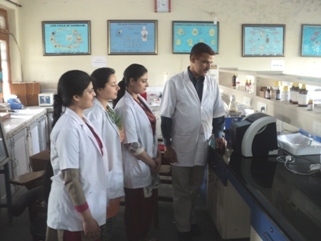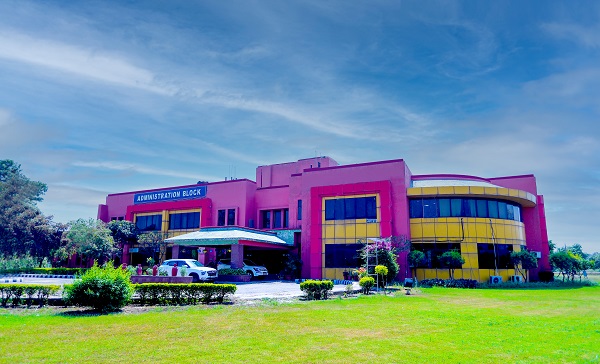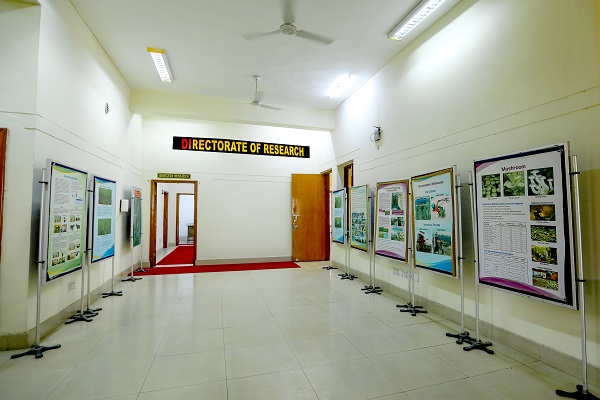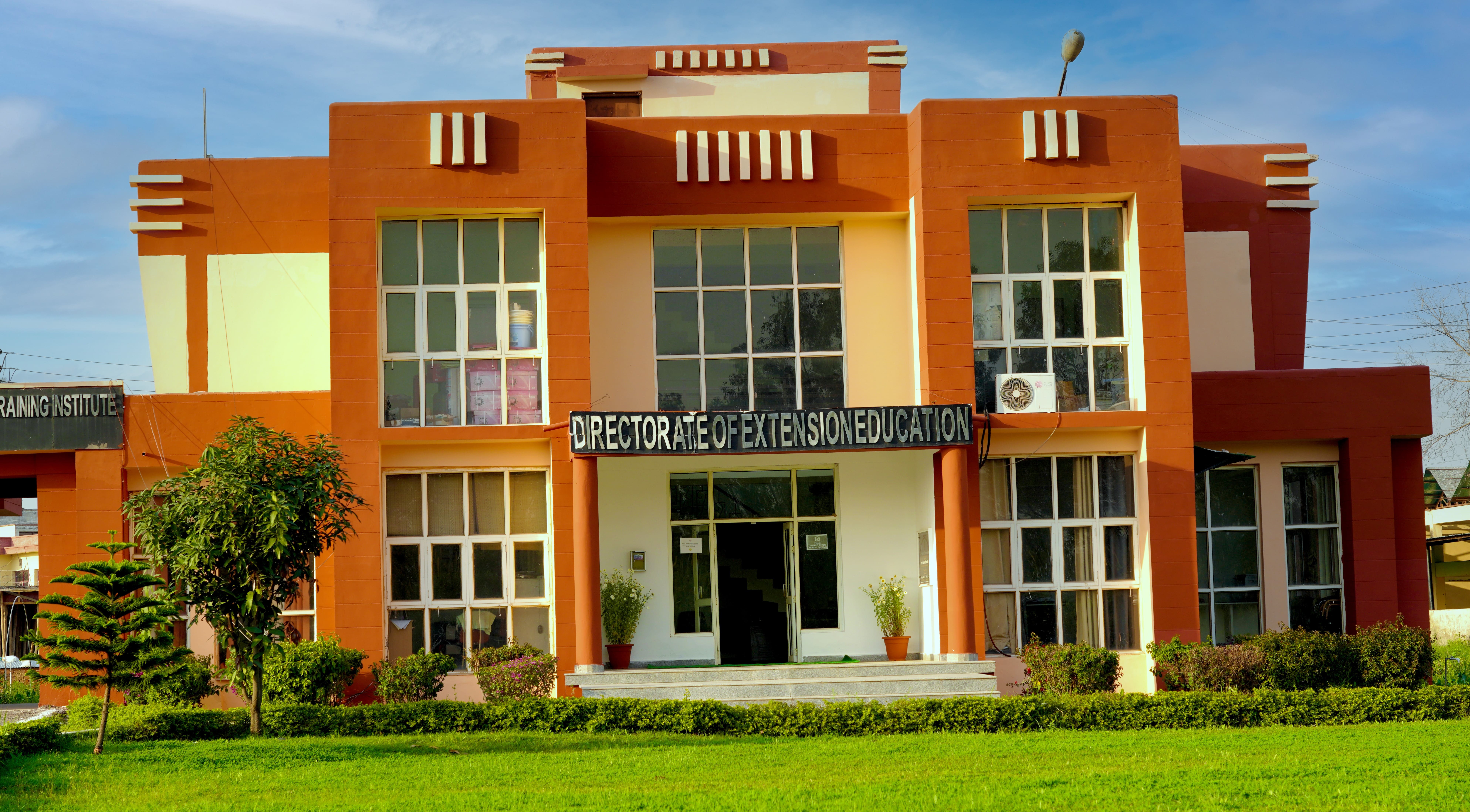
Teaching :
a) TEACHING • B.V.Sc. & A.H. • M.V.Sc. • Ph.D
Research :
Flag Ship Areas: • Diagnosis and sustainable control of parasitic diseases • Zoonotic diseases of parasitic origin
Extension :
• Drenching and dipping of livestock in adopted villages • Kisan Mela, Extension lectures to Veterinary officers, para veterinary staff and farmers.
The flagship areas :-
- Diagnosis and sustainable control of parasitic diseases
- Zoonotic diseases of parasitic origin
 |
Name : | Dr. Rajesh Katoch |
| Designation : | Professor & Head | |
| Area of Specialization : | Veterinary Helminthology, Parasitic zoonoses and chemotherapy | |
| E mail : | rkatoch1963@yahoo.co.in | |
| Contact No : | 9419236788 | |
| Profile : | View Profile |
 |
Name : | Dr. Anish Yadav |
| Designation : | Professor and ICAR-National Fellow | |
| Area of Specialization : | Veterinary Parasitology | |
| E mail : | anishyadav25@gmail.com | |
| Contact No : | 9419145424 | |
| Profile : | View Profile |
 |
Name : | Dr. Sanku Borkataki |
| Designation : | Associate Professor | |
| Area of Specialization : | Zoonotic diseases of helminthes origin. | |
| E mail : | borkataki_sanku@rediffmail.com | |
| Contact No : | 7780929171 | |
| Profile : | View Profile |
 |
Name : | Dr. Rajesh Godara |
| Designation : | Assistant Professor | |
| Area of Specialization : | Veterinary Parasitology | |
| E mail : | godara1972@gmail.com | |
| Contact No : | 9419774615 | |
| Profile : | View Profile |
| Name of Project | Principal Investigator | Funding agency | Duration and date of start | Remarks |
| “Technological intervention to improve production of dairy and poultry in rainfed areas of Jammu District” | Dr. Rajesh Katoch | DST, New Delhi | 3 years | Download |
| "Detection of acaricide resistance in tick" | Dr. Rajesh Katoch | RKVY | 3 years | Download |
| Development of sensitive and specific diagnostic assay for the detection of warble fly infestation in goats and eradication of the disease from Jammu and Kashmir | Dr. Anish Yadav, Professor and ICAR- National Fellow | ICAR, New Delhi | 5 years | Download |
| Sustainable management of parasitic diseases in migratory flocks and dairy animals of rainfed areas of Jammu region | Dr. Rajesh Katoch | NABARD | 2 years | Download |
Under Graduate
View Course DetailsPost Graduate
View Course DetailsDoctorate (PhD)
View Course Details| Name : | Sabhyata Sharma |
| Degree : | PhD |
| Topic : | Molecular studies on the prevalence of Tick borne Haemoprotozoan and Rickettsial infections in Canine and vector ticks |
| Major : | Dr. Anish Yadav |
| Year : | 2023 |
| Name : | Dr. Kaifa Nazim |
| Degree : | PhD |
| Topic : | “Detection of ivermectin resistance and its mitigation in Rhipicephalus (Boopilus) microplus of Jammu region” |
| Major : | DR. RAJESH KATOCH |
| Year : | 2022 |
| Name : | Aiman Khursheed |
| Degree : | PhD |
| Topic : | Molecular characterization of Eimeria spp infecting poultry and evaluation of ionophore resistance against caecal coccidiosis in Jammu region |
| Major : | Dr. Anish Yadav |
| Year : | 2022 |
| Name : | Omer Mohi U Din Sofi |
| Degree : | PhD |
| Topic : | Epidemiological studies and molecular characterization of gastrointestinal helminthosis in migratory sheep and goats of Jammu region |
| Major : | Dr. Rajesh Godara |
| Year : | 2022 |
| Name : | Dr. Yash Bhargava |
| Degree : | MVSC |
| Topic : | entitled “Gastrointestinal parasitism in buffaloes of Jammu region” |
| Major : | DR. RAJESH KATOCH |
| Year : | 2021 |
| Name : | Dr. Rabjot Kour |
| Degree : | PhD |
| Topic : | Molecular Studies on the Prevalence of tick borne haemoprotozoan and rickettsial infections in bovines and vector ticks |
| Major : | Dr. Anish Yadav |
| Year : | 2020 |
| Name : | Dr. Rajesh Godara |
| Degree : | PhD |
| Topic : | Status of pyrethroid resistance and role of esterases in its detoxification mechanism in Rhipicephalus (Boophilus) microplus isolates of Jammu region |
| Major : | Dr. Rajesh Katoch |
| Year : | 2019 |
| Name : | Dr. Mufeeda Tariq |
| Degree : | MVSc |
| Topic : | Detection of antimicrobial properties of Chrysomyia megacephala larvae in chronic wound healing |
| Major : | Dr. Sanku Borkataki |
| Year : | 2019 |
| Name : | Taniya Saleem |
| Degree : | PhD |
| Topic : | “Anthelmintic resistance in Haemonchus contortus of small ruminants in Jammu” |
| Major : | Dr. Rajesh Katoch |
| Year : | 2018 |
| Name : | Sanku Borkataki |
| Degree : | PhD |
| Topic : | “Evaluation of maggot therapy in the treatment of chronic wound in rat” |
| Major : | Dr. Rajesh Katoch |
| Year : | 2017 |
| Name : | Sarwar Ahmed Ganaie |
| Degree : | MVSc |
| Topic : | Epidemiology of dicrocoeliosis in sheep and goats of Jammu region |
| Major : | Dr. Rajesh Godara |
| Year : | 2016 |
| Name : | Akhiyar Khan |
| Degree : | MVSc |
| Topic : | “Subgenotype analysis of Cryptosporidium parvum isolates from pre-weaned lambs and goat kids in Jammu region” |
| Major : | Dr. Anish Yadav |
| Year : | 2016 |
| Name : | Shikha Sharma |
| Degree : | PhD |
| Topic : | “Interaction studies on Cutaneous Larvae Migran and Diabetes mellitus” |
| Major : | Dr. Rajesh Katoch |
| Year : | 2016 |
| Name : | Dr. Sahil Kumar |
| Degree : | PhD |
| Topic : | “Chemotherapeutic and Interaction studies between Visceral Larvae Migran and Diabetes mellitus” |
| Major : | Dr. Rajesh Katoch |
| Year : | 2016 |
| Name : | Shaweta Dutta |
| Degree : | MVSc |
| Topic : | “Detection of acaricide resistance in Rhipicephalus (Boophilus) microplus against malathion and amitraz” |
| Major : | Dr. Rajesh Katoch |
| Year : | 2016 |
| Name : | Aiman Khursheed |
| Degree : | MVSc |
| Topic : | “Molecular characterization of Cryptosporidium spp. infection in pregnant goats & their implications in neonatal kids” |
| Major : | Dr. Anish Yadav |
| Year : | 2016 |
| Name : | Fakhrun Nisa |
| Degree : | MVSc |
| Topic : | “Status of acaricide resistnace in Rhipicephalus (Boophilus) microplus against diazinon and fenvalerate” |
| Major : | Dr. Anish Yadav |
| Year : | 2016 |
| Name : | Damandeep Kaur |
| Degree : | MVSc |
| Topic : | “Molecular characterization and chemotherapeutic management of Cryptosporidiosis in small ruminants ” |
| Major : | Dr. Rajesh Katoch |
| Year : | 2015 |
| Name : | Rafiqur Rehman Ahanger |
| Degree : | MVSc |
| Topic : | “Studies on deltamethrin resistance in Rhipicephalus microplus of Jammu and Kashmir “ |
| Major : | Dr. Rajesh Godara |
| Year : | 2015 |
| Name : | Arjun Dev Singh Bhutyal |
| Degree : | MVSc |
| Topic : | Evaluation of some herbal acaricides against Rhipicephalus microplus |
| Major : | Dr. Rajesh Godara |
| Year : | 2015 |
| Name : | Kaifa Nazim |
| Degree : | MVSc |
| Topic : | Subgenotype analysis of Cryptosporidium parvum isolates from pre-weaned cattle calves in J&K |
| Major : | Dr. Anish Yadav |
| Year : | 2015 |
| Name : | Alveena Ganai |
| Degree : | MVSc |
| Topic : | Molecular characterization and Chemotherapeutic management of bovine Cryptosporidiosis. |
| Major : | Dr. Anish Yadav |
| Year : | 2014 |
| Name : | Shiasta Parveen |
| Degree : | MVSc |
| Topic : | Efficacy of herbal acaricides against Jammu isolates of Rhipicephalus (Boophilus) microplus |
| Major : | Dr. Rajesh Godara |
| Year : | 2014 |
| Name : | Taniya Saleem |
| Degree : | MVSc |
| Topic : | Epidemiology of “Oestrus ovis” in sheep and goat. |
| Major : | Dr. Rajesh Katoch |
| Year : | 2013 |
| Name : | Shikha Sharma |
| Degree : | MVSc |
| Topic : | Epidemiological investigation of Giardiosis in animal and humans |
| Major : | Dr. Rajesh Katoch |
| Year : | 2012 |
| Name : | Sertaj Ahmad Bhat |
| Degree : | MVSc |
| Topic : | Epidemiological studies of parasites and their traits in backyard poultry in Jammu |
| Major : | Dr. J. K. Khajuria |
| Year : | 2012 |
| Name : | Varun Khajuria |
| Degree : | MVSc |
| Topic : | Prevalence and acaricide resistance in ticks of bovines of Jammu district |
| Major : | Dr. Rajesh Godara |
| Year : | 2012 |
| Name : | Rabjot Kour |
| Degree : | MVSc |
| Topic : | Seasonal prevalence of cutaneous myiasis in animal in Jammu |
| Major : | Dr. Rajesh Katoch |
| Year : | 2011 |
| Name : | Tazeen Nazir |
| Degree : | MVSc |
| Topic : | Epidemiology and chemotherapeutic studies of parasites of buffalo |
| Major : | Dr. Rajesh Katoch |
| Year : | 2011 |
| Name : | Irshad Ahmed |
| Degree : | MVSc |
| Topic : | Epidemiological studies of cryptosporidiosis in sheep and goats |
| Major : | Dr. Anish Yadav |
| Year : | 2011 |
| Name : | Peerzada Aijaz Ahmed |
| Degree : | MVSc |
| Topic : | Prevalence of gastrointestinal helminthes in dogs of Jammu |
| Major : | Dr. Rajesh Katoch |
| Year : | 2010 |
| Name : | Dr. Anish Yadav |
| Degree : | PhD |
| Topic : | Epidemiological pattern and zoonotic potential of bovine crypsporidiosis in Jammu District. |
| Major : | Dr. Rajesh Katoch |
| Year : | 2010 |
| Name : | Dr. J.K. Khajuria |
| Degree : | PhD |
| Topic : | Studies of epidemiology and resistance against benzimidazoles in gastrointestinal nematodes of small ruminants |
| Major : | Dr. Rajesh Katoch |
| Year : | 2010 |
Farmer Information
1. On
the basis of research work carried in the Jammu region, the deworming schedule
recommended for ruminants is as:-
a. Late
March / early April for strongyles.
b. Late
August / early September for strongyles.
c. Late
October / early November for Amphistomes in plains and fascioliosis in hills.
2. Strategic
deworming increase the production of livestock by 15-20 % as well as helps in
reduction of infertility
3. Single
microdose of invermectin (5 microgram/ kg b wt) in July/August is highly
effective against warble fly infestation
in goats and cattle
4. Backyard
poultry has vast scope in hilly stated like J&K and helps in economic
upliftment and nutritional status of rural people particularly women and
children. Moreover it was observed that one poultry bird give an economic
benefit of Rs. 1370.
5. Examination
of fecal samples of dogs and cats of Jammu region showed high prevalence of
zoonotic parasites (e.g. hoolworm, ascarid etc.). Thus, deworming / population
control of stray animals is recommended.
6. The
genetic characterization of diarrhoeic livestock, children and HIV positive
patients of Jammu revealed presence of zoonotic species of Cryptosporidium i.e C. parvum, C.
ubiquitum so preventive measure should be adopted.
7.
To check
the spread of anthelminthic resistance, there is urgent need to adopt
corrective measures like strategic deworming, change of anthelmentic group,
correct dose, perfect drenching device and effective managemental practices.
8.
Resistance
in ticks of Jammu region has been observed against deltamethrin
Document : (Click to View)
Video : (Click to View)
Farmer Information
1. On
the basis of research work carried in the Jammu region, the deworming schedule
recommended for ruminants is as:-
a. Late
March / early April for strongyles.
b. Late
August / early September for strongyles.
c. Late
October / early November for Amphistomes in plains and fascioliosis in hills.
2. Strategic
deworming increase the production of livestock by 15-20 % as well as helps in
reduction of infertility
3. Single
microdose of invermectin (5 microgram/ kg b wt) in July/August is highly
effective against warble fly infestation
in goats and cattle
4. Backyard
poultry has vast scope in hilly stated like J&K and helps in economic
upliftment and nutritional status of rural people particularly women and
children. Moreover it was observed that one poultry bird give an economic
benefit of Rs. 1370.
5. Examination
of fecal samples of dogs and cats of Jammu region showed high prevalence of
zoonotic parasites (e.g. hoolworm, ascarid etc.). Thus, deworming / population
control of stray animals is recommended.
6. The
genetic characterization of diarrhoeic livestock, children and HIV positive
patients of Jammu revealed presence of zoonotic species of Cryptosporidium i.e C. parvum, C.
ubiquitum so preventive measure should be adopted.
7.
To check
the spread of anthelminthic resistance, there is urgent need to adopt
corrective measures like strategic deworming, change of anthelmentic group,
correct dose, perfect drenching device and effective managemental practices.
8.
Resistance
in ticks of Jammu region has been observed against deltamethrin
Document : (Click to View)
Video : (Click to View)
Document : (Click to View)
Video : (Click to View)
1. On
the basis of research work carried in the Jammu region, the deworming schedule
recommended for ruminants is as:-
a. Late
March / early April for strongyles.
b. Late
August / early September for strongyles.
c. Late
October / early November for Amphistomes in plains and fascioliosis in hills.
2. Strategic
deworming increase the production of livestock by 15-20 % as well as helps in
reduction of infertility
3. Single
microdose of invermectin (5 microgram/ kg b wt) in July/August is highly
effective against warble fly infestation
in goats and cattle
4. Backyard
poultry has vast scope in hilly stated like J&K and helps in economic
upliftment and nutritional status of rural people particularly women and
children. Moreover it was observed that one poultry bird give an economic
benefit of Rs. 1370.
5. Examination
of fecal samples of dogs and cats of Jammu region showed high prevalence of
zoonotic parasites (e.g. hoolworm, ascarid etc.). Thus, deworming / population
control of stray animals is recommended.
6. The
genetic characterization of diarrhoeic livestock, children and HIV positive
patients of Jammu revealed presence of zoonotic species of Cryptosporidium i.e C. parvum, C.
ubiquitum so preventive measure should be adopted.
7.
To check
the spread of anthelminthic resistance, there is urgent need to adopt
corrective measures like strategic deworming, change of anthelmentic group,
correct dose, perfect drenching device and effective managemental practices.
8.
Resistance
in ticks of Jammu region has been observed against deltamethrin
Document : (Click to View)
Video : (Click to View)
1. On
the basis of research work carried in the Jammu region, the deworming schedule
recommended for ruminants is as:-
a. Late
March / early April for strongyles.
b. Late
August / early September for strongyles.
c. Late
October / early November for Amphistomes in plains and fascioliosis in hills.
2. Strategic
deworming increase the production of livestock by 15-20 % as well as helps in
reduction of infertility
3. Single
microdose of invermectin (5 microgram/ kg b wt) in July/August is highly
effective against warble fly infestation
in goats and cattle
4. Backyard
poultry has vast scope in hilly stated like J&K and helps in economic
upliftment and nutritional status of rural people particularly women and
children. Moreover it was observed that one poultry bird give an economic
benefit of Rs. 1370.
5. Examination
of fecal samples of dogs and cats of Jammu region showed high prevalence of
zoonotic parasites (e.g. hoolworm, ascarid etc.). Thus, deworming / population
control of stray animals is recommended.
6. The
genetic characterization of diarrhoeic livestock, children and HIV positive
patients of Jammu revealed presence of zoonotic species of Cryptosporidium i.e C. parvum, C.
ubiquitum so preventive measure should be adopted.
7.
To check
the spread of anthelminthic resistance, there is urgent need to adopt
corrective measures like strategic deworming, change of anthelmentic group,
correct dose, perfect drenching device and effective managemental practices.
8.
Resistance
in ticks of Jammu region has been observed against deltamethrin
Document : (Click to View)
Video : (Click to View)
Farmer Information
1. On
the basis of research work carried in the Jammu region, the deworming schedule
recommended for ruminants is as:-
a. Late
March / early April for strongyles.
b. Late
August / early September for strongyles.
c. Late
October / early November for Amphistomes in plains and fascioliosis in hills.
2. Strategic
deworming increase the production of livestock by 15-20 % as well as helps in
reduction of infertility
3. Single
microdose of invermectin (5 microgram/ kg b wt) in July/August is highly
effective against warble fly infestation
in goats and cattle
4. Backyard
poultry has vast scope in hilly stated like J&K and helps in economic
upliftment and nutritional status of rural people particularly women and
children. Moreover it was observed that one poultry bird give an economic
benefit of Rs. 1370.
5. Examination
of fecal samples of dogs and cats of Jammu region showed high prevalence of
zoonotic parasites (e.g. hoolworm, ascarid etc.). Thus, deworming / population
control of stray animals is recommended.
6. The
genetic characterization of diarrhoeic livestock, children and HIV positive
patients of Jammu revealed presence of zoonotic species of Cryptosporidium i.e C. parvum, C.
ubiquitum so preventive measure should be adopted.
7.
To check
the spread of anthelminthic resistance, there is urgent need to adopt
corrective measures like strategic deworming, change of anthelmentic group,
correct dose, perfect drenching device and effective managemental practices.
8.
Resistance
in ticks of Jammu region has been observed against deltamethrin
Document : (Click to View)
Video : (Click to View)
Farmer Information
1. On
the basis of research work carried in the Jammu region, the deworming schedule
recommended for ruminants is as:-
a. Late
March / early April for strongyles.
b. Late
August / early September for strongyles.
c. Late
October / early November for Amphistomes in plains and fascioliosis in hills.
2. Strategic
deworming increase the production of livestock by 15-20 % as well as helps in
reduction of infertility
3. Single
microdose of invermectin (5 microgram/ kg b wt) in July/August is highly
effective against warble fly infestation
in goats and cattle
4. Backyard
poultry has vast scope in hilly stated like J&K and helps in economic
upliftment and nutritional status of rural people particularly women and
children. Moreover it was observed that one poultry bird give an economic
benefit of Rs. 1370.
5. Examination
of fecal samples of dogs and cats of Jammu region showed high prevalence of
zoonotic parasites (e.g. hoolworm, ascarid etc.). Thus, deworming / population
control of stray animals is recommended.
6. The
genetic characterization of diarrhoeic livestock, children and HIV positive
patients of Jammu revealed presence of zoonotic species of Cryptosporidium i.e C. parvum, C.
ubiquitum so preventive measure should be adopted.
7.
To check
the spread of anthelminthic resistance, there is urgent need to adopt
corrective measures like strategic deworming, change of anthelmentic group,
correct dose, perfect drenching device and effective managemental practices.
8.
Resistance
in ticks of Jammu region has been observed against deltamethrin
Document : (Click to View)
Video : (Click to View)
Document : LIVER FLUKE INFESTATION IN SHEEP AND GOAT (Click to View)
Video : (Click to View)
Document : (Click to View)
Video : (Click to View)
Document : NUTRITIONAL VALUE OF CHICKEN EGG (Click to View)
Video : (Click to View)
Document : BASIC LABORATORY DIAGNOSIS PROCEDURES FOR MICROSCOPIC EXAMINATION OF FAECAL SAMPLES OF INTESTINAL PROTOZOAN OOCYSTS (Click to View)
Video : (Click to View)








.png)